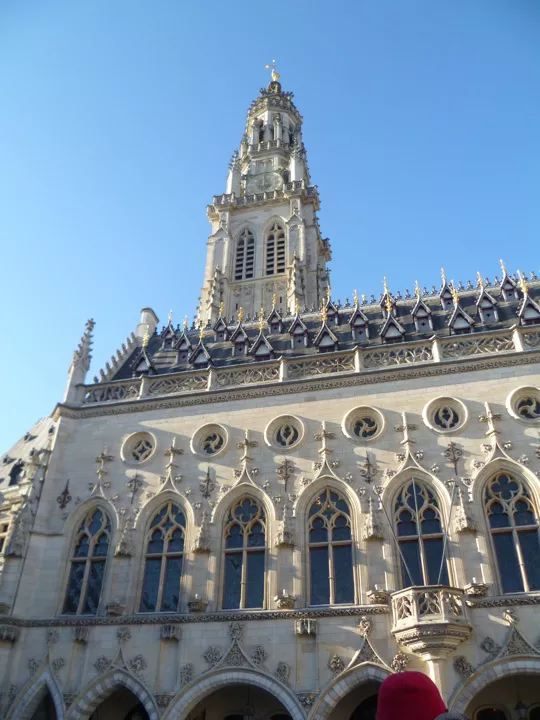Summary
A Historic and Pretty City
Arras, the capital of the Artois region in northern France, is renowned for its stunning Grand’ Place and the charming place des Heros. As one of the most picturesque towns in northern France, its architectural masterpieces were crafted in the Flemish Renaissance style. The Grand’ Place is enveloped by tall red brick and stone houses, adorned with rounded gables and a series of arcades at street level. Although the squares appear historic, the city underwent significant restoration following the devastation of World War I, which obliterated its old heart. Arras has always been a pivotal trading hub in northern France.
Fast Facts
- Capital of the Artois Region
- Located in the new Hauts de France region (62)
- Approximately 42,000 residents in the city
- 124,200 people in the greater Arras area
How to Get to Arras
- By train: Fast TGV trains from Paris Nord depart regularly and take approximately 49 minutes to reach Arras, with fares starting at 21 euros. The Arras station is a ten-minute walk from the Hotel de Ville via rue Gambetta and rue Desire Delansorne. For train schedules and bookings, contact SNCF in France at 36-35. For international inquiries, call 00 33 8-92-35-35-35. Visit the SNCF website for more information.
- From the UK: Take the Eurostar to Gare Lille Europe, then transfer to a TGV train to Arras, which takes about 30 minutes.
- By car: Drive from Paris taking the A1 motorway north to exit 14, then follow the D937 straight to Arras.
- By ferry from the UK: Check ferry options from Dover to Calais. From Calais, take the A26/E15 motorway and exit at 7 to arrive in Arras. The distance is 112 kilometers, which takes just over an hour.
Tourist Office:
Town Hall
Place des Heros
Tel.: 00 33 (0)3 21 51 26 95
Website
Where to Stay
Arras offers a wide range of accommodation options, both modern and historic.
- Najeti Hotel de l’Univers
3 & 5 Pl de la Croix Rouge
Tel.: 00 33 (0)3 21 71 34 01
Website
This hotel is located in a former Jesuit monastery surrounding a cobbled courtyard. Rooms provide comfort and are conveniently located just ten minutes from the town center. It is the premier hotel in town and offers cooking classes with its chef. - Hotel Diamant
5 pl des Heros
Tel.: 00 33 (0)3 21 71 23 23
Website
Situated in the heart of Arras, this small, two-star hotel has recently been refurbished. It is known for its friendly service, although it does not have an elevator. - Holiday Inn Express
3 rue du Docteur Brassart
Tel.: 00 33 (0)3 21 60 88 88
Website
Centrally located near the railway station, this business hotel offers comfortable accommodations with good bathrooms and some spacious rooms.
Where to Eat
- La Faisanderie
45 Grand’Place
Tel.: 00 33 (0)3 21 48 20 76
Website
This acclaimed restaurant features a red brick cellar with a shady outdoor terrace ideal for summer dining. Their exceptional 29-euro menu includes oysters or foie gras, followed by dishes like andouillette, magret duck, or cod, concluding with goat cheese or a delightful mango and lychee crumble. - La Coupole d’Arras
26 bd de Strasbourg
Tel.: 00 33 (0)3 21 71 88 44
The Art Deco interior, complete with stained glass, offers a refreshing change from typical brasseries and red brick cellars in town. Their extensive menu features specialities like plateau de fruits de mer. - Le Carnot
Hotel Astoria-Carnot
10-12 pl Foch
Tel.: 00 33 (0)3 21 71 08 14
This lively establishment, connected to the Hotel Astoria-Carnot, caters to a variety of tastes with its diverse regional menu and brasserie classics. - Le Between Terre et Mer
12 rue de la Taillerie
Tel.: 00 33 (0)3 21 73 57 79
Step into the inviting cellar for delectable Land and Sea dishes. Enjoy offerings like roast duck with pears in wine or salmon with ginger and pineapple in a friendly atmosphere.
Attractions
Arras boasts an array of attractions, from the magnificent Grand’Place to the captivating World War I Wellington Quarry Museum. With a rich history stretching over centuries, Arras is a must-visit destination.
After exploring the Grand’ Place, visit the Town Hall located in the picturesque place des Heros. This site includes an informative exhibition of photographs detailing Arras during World War I. Climbing the belfry offers an impressive view of the town.
Dive beneath the surface to discover the town hall boves (a series of cellars once utilized as warehouses). Arras features many early cellars dating back to the 10th century, reflecting its historical significance.
The Abbaie de Saint-Vaast, an 18th-century classical structure, houses the Fine Arts Museum at 22 rue Paul-Doumer. Although currently a magnificent yet decaying site, there are future plans for its redevelopment as part of an expansive cultural project. Visitors can appreciate the extensive collection of 17th-century paintings, including a piece by Rubens and an Arras-made tapestry from the city’s tapestry-making era.
The Vauban Citadel, located on the western outskirts of the town, was designated as a UNESCO World Heritage Site in 2008. Constructed between 1667 and 1672, this defensive system aimed to protect the towns of Louis XIV, making it a historically significant site.
Additionally, don’t overlook the British Memorial, a World War I cemetery inscribed with the names of 35,942 soldiers who went missing during the battles of Artois, providing a somber reminder of the past.
Sights Outside Arras
Arras held a crucial position on the Western Front, marked by fierce battles over the surrounding coalfields. Visitors can easily reach Vimy Ridge and the war cemeteries of the French at Notre-Dame de Lorette, the Commonwealth soldiers at Cabaret-Rouge, and the German cemetery at Neuville-Saint-Vaast by car or taxi.




